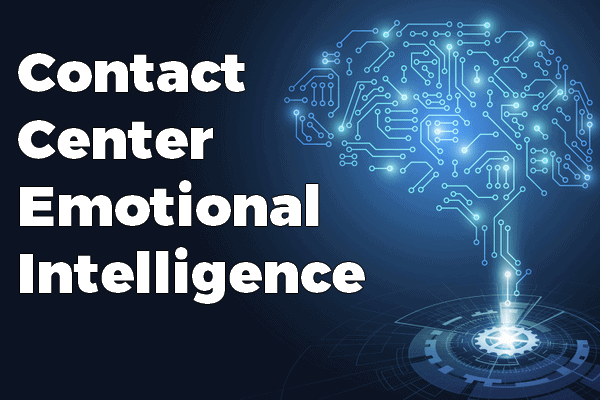Emotions are inextricably tied to cognition and decision-making. Emotions do, in fact, influence our actions. This is why emotional intelligence is such an important managerial talent to cultivate and foster within a company. This ability enables you to comprehend emotions and how to use them in order to nurture good customer relationships.
Although it is still simply a “beautiful notion” for far too many businesses and contact centers. Companies that have not engaged in training their managers’ interpersonal abilities will fall behind the competition. Turnover rates and reasons for leaving already reveal the influence of the manager-employee relationship and it’s not always about performances and numbers. In this article, we explore the influence of emotional intelligence in companies and how to unlock it for contact centers.
Emotional Intelligence’s significance in Businesses

We must be mindful of our own emotions in the job in order to be aware of our effect on others and to have a positive influence on our team. Most managers are afraid of failing to meet goals, losing face, or having to re-coach an employee who may resign. It is critical to understand that fear can cause managers and leaders to avoid situations and exert too much control over their resources. And emotional intelligence is a set of attitudes that involves:
- The capacity to accept our feelings, notice their influence on others, and develop a good self-image is referred to as self-awareness. It enables managers to take on more responsibility for our functions and judgments. This ability is also necessary for the development of self-confidence.
- In that regard, self-management (or self-control) is the process of regulating our emotions and managing our impulses. It is the capacity to behave appropriately and with consideration. The aim and necessity of this talent for the leader are excellently shown by a quotation from Peter Drucker, an American management theorist: “He who cannot manage himself cannot manage anybody.” This ability enables leaders to inspire trust and be at ease with ambiguity.
- The ability to perceive others with sensitivity and empathy is referred to as awareness of others (or empathy). It is also the capacity to engage with people in an emotionally sensitive manner. This ability enables the development and retention of abilities, as well as the development of a “service” attitude toward others.
- The capacity to handle conflict via collaboration is referred to as relationship management (or social skills). Social skills enable the formation of commercial networks and the identification of similar targets. This talent will have an impact on peer influence and the capacity to persuade.
The explanation is straightforward: you must work with people. To inspire trust and have a positive impact on the soldiers, you must inspire trust and have a positive influence. To optimize innovation and creativity, you must be available to your team and provide the essential support for the emergence of new ideas, new ways of doing things, and new partnerships. Emotional intelligence will be the primary ability for success in human resource management as long as firms deal with people.
How to develop Conscious Leadership?
The development of emotional intelligence leads to conscious leadership. It is far more than managing your emotions; it is the capacity to cultivate your presence and attention on a regular basis. Conscious leadership applies the notion of awareness to corporate management.
Leadership is also characterized as “a new leadership paradigm that focuses on the common good rather than self-interest directed by a vision and motivated by values that strive for the well-being of all stakeholders as much as organizational success.”
The following are the 7 degrees of awareness that a leader can develop:
- Survival necessitates decisive management and accepting responsibility for financial stability.
- Relationships: open communication, employee care
- Self-esteem: productivity, efficiency, and quality
- Transformation entails constant renewal, learning, and creativity.
- Internal cohesiveness is characterized by positive leadership, a common vision, and values.
- Mentoring, coaching, and staff development may all make a difference.
- Service entails having an ethical long-term perspective and helping future generations.
How can you become a conscious leader?
You may improve your emotional agility as a contact center leader by going through the following steps:
- Recognize your emotions and stay away from their traps. A good leader must be vulnerable in order to gain the trust of his staff. His teammates will then respect his humanity and consistency. Name what you’re experiencing and accept it without resentment. Take a step back and make a separation between your emotions and your actions.
- Each emotion hides a deep need that needs to be understood. You must take a step back and allow the emotion to calm in order to discern this desire. A negative reaction to an emotion indicates a rejected and unsatisfied need.
- Choose the best strategy and be aware of your mental state, motives, and values. Consider your choices before acting. You will be able to implement a plan that is consistent with your motives and values in this manner.
- Act in accordance with your principles and courageously do the path. Take action and follow through on your decision.
Management entails more than just being able to execute the task that your team is capable of doing. It is about learning how to deal with difficult situations in contact centers, which frequently include emotional intelligence. Listen to Jim Rembach, President of CX Global Media, speak on our podcast First Contact: Stories from the Contact Center.
Emotional intelligence in the Contact Center World
 Brands that use Emotional Intelligence attempt to impact consumers’ inner conversation. This discussion is responsible for eliciting the emotions required to make a purchase, subscribe, or visit a website. That is why we build marketing and sales tactics to attract as many consumers as possible.
Brands that use Emotional Intelligence attempt to impact consumers’ inner conversation. This discussion is responsible for eliciting the emotions required to make a purchase, subscribe, or visit a website. That is why we build marketing and sales tactics to attract as many consumers as possible.
You will have a greater chance of converting your prospects if you use Emotional intelligence at every stage of the customer journey. We advise you to include emotions in your customer service, sales, and customer support initiatives. The consumer experience will become more consistent as a result of this.
Consumers are more concerned about the quality of the customer experience. You provide them with a one-of-a-kind experience that they will remember by employing Emotional Intelligence. That is how you will distinguish yourself from the competition.
Customers, on the other hand, pay attention to the emotions they feel during the purchasing process. This intelligence contributes to the creation of an environment that encourages consumer interaction. Customers are more likely to engage with companies that elicit a certain emotion. In the long term, these engaged clients will serve as brand evangelists and refer you to their friends. Your chances of conversion and delivering an excellent customer experience will improve, as will your customer portfolio.
At the customer service level, we make certain that our consultants are trained in Emotional Intelligence practices. Our agents are better equipped to exhibit empathy to their interlocutors when they consider the emotions of consumers in distress. As a consequence, they can recognize requirements and respond properly.
Callers will feel appreciated and will benefit from their customer experience as a result. Furthermore, the solutions offered with the assistance of EI meet the clients’ expectations, and as a result, the latter will become devoted customers.
Nancy Munro is an expert in contact center training simulations. For years she worked with someone to develop software that can measure people’s emotions. Hence, the question: is measuring customer emotions actually a good idea? Listen to her point of view on the topic.
The power of emotions for Sales agent
In sales, emotional intelligence is a key component. Putting a great salesperson through a challenging campaign is the actual litmus test. Many people make the mistake of allowing their emotions to take precedence over their goals. This leads to ineffective actions such as selling things without nurturing customer loyalty, pursuing unqualified prospects, and so on.
In sales, the following emotional intelligence qualities are essential. As a sales agent you need the following attributes to succeed:
- Empathy: The capacity to perceive and acknowledge your prospect’s thoughts and feelings is referred to as empathy. It has an impact on your general attitude toward another individual in sales. Can you look at them objectively? Do you make an effort to comprehend their motivations? Is your customer care team alert and capable of anticipating consumer needs?
- Self-awareness: Take a step back from your aspirations and look at yourself for a while. Keep in mind that you have your own objectives and needs. You, too, have your own set of skills and weaknesses. Wherever you are in your “self-knowledge” journey influences how you reach out to others. Do you have faith in yourself? Are you able to maintain your position and persuade your audience to adopt your viewpoint? Can you persuade and entice your prospect? When you have a high level of self-awareness, you may approach business partnerships strategically. Instead of emphasizing your flaws, play to your strengths. Do all in your power to develop and become a more emotionally savvy seller.
- Self-evaluation: You must have high self-esteem if you want to be successful in this industry. Selling entails rejection. By confronting this truth, a salesman can attain success.
- Self-expectation: What do you desire for yourself, and how do you plan to get it? Are you driven enough to strive to reach your objectives? Do you have what it takes to support the effort required to attain those objectives? It normally takes months to advance in sales. But in the contact center industry, you don’t have that luxury. The hours are demanding, and the job may be difficult at times. If you want to be successful, you must be driven, consistent, and optimistic.
The Beneficial Effects of Technology
When the correct culture is in place, technology may aid in the development of Emotional Intelligence. For starters, it enables us to employ procedures to assess not just client happiness but also agent satisfaction. Simple tools, such as happy/disgruntled emojis or a star rating system to click on in the end-of-call reports that agents fill out, can give some preliminary insights about their emotions.
When an agent exhibits indications of anxiousness, tools such as Speech Analytics can alert supervisors. Finally, self-service technologies and skill-based routing can minimize the number of regular calls that agents must handle, allowing them to concentrate on more complicated conversations that demand greater emotional engagement.
Furthermore, the advantages of voice analytics are apparent, but are they applicable to all contact centers? With decades of consulting expertise, Fred Stacey Co-Founder & GM of Cloud Call Center Search believes it is helpful to enterprises only when properly deployed and driven to the agent level.
Being a leader in 2022

As a leader, the better your emotional intelligence, the better your relationships with others. But make no mistake. While these actions and answers may appear straightforward, building conscious leadership for 2022 and beyond will require time, coaching, practice, and a genuine culture shift in your contact center.
The conscientious leader understands his authority and does not respond in ego. They understand that if people are not comfortable expressing themselves or bringing fresh ideas to the table, group dynamics will suffer.
Exceptional leaders serve others, contribute to their teams’ success, and form deep bonds with those around them. Their concern may be seen in their deeds, heard in their words, and felt by others. Companies that do not invest in improving their managers’ emotional intelligence will struggle to create conscious leadership, an atmosphere that fosters collective intelligence and encourages the expression of creativity and innovation.
As a leader with 20 years of experience in the CCaaS industry, Nobelbiz helps contact centers all over the world achieve their maximum productivity potential while also helping them deliver excellent customer experience.
Our solution involves offering the only voice service designed from the ground up to serve the demands of the heavy call-center-specific traffic, paired with an industry-leading omnichannel cloud contact center software and unique customer-centric support procedures that make us the promise keepers of the industry.

Abdelmounim Benharouga has always had a strong passion for writing and digital marketing. He started as a Digital Content Writer part of marketing department then moved to being Customer Success Manager for the African Region within the Nobelbiz team.






